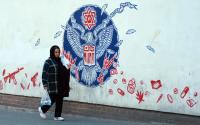Published on Sunday, February 20, 2005 by The Sunday Herald (Scotland) Trevor Royle
Congress might still have to confirm the full extent of his powers, but there is little doubt that John Negroponte's new position in Washington as George Bush's first Director of National Intelligence (DNI) will be omnipotent.
Not only will he be in overall control of all 15 agencies involved in the war against terrorism but he will have unprecedented power in deciding and executing policy, allocating budgets and giving the authority for covert operations.
In appointing Negroponte, a career diplomat, Bush has brought a new and, to many, unwelcome twist to the US war on terror. Coming on top of his statement that he would support Israel if it mounted an attack against Iran's nuclear facilities, and following recent talk of enforcing regime change in Iran and Syria, it sends the signal that the US is entering a new phase in its operations against those countries suspected of sponsoring al-Qaeda and its allies.
Members of the US security community believe Negroponte will give the CIA and other agencies new focus by ending the rivalry that bedevils their operations.
John McGaffin, former associate deputy director of CIA operations said: "Right now, our war in counter-terrorism looks more like kids' soccer, with everybody doing everything that they want to do in all directions. What we have got to do is make it look like more organized, professional football where you have plays and people know what they're supposed to do, and some adult is in charge."
While McGaffin's analogy will be welcomed by security professionals who say the US war on terror is going nowhere and has become badly bogged down in Iraq, Negroponte's appointment seems to have been brought into being without any political checks and balances other than in reporting directly to the President.
Not only does this make him the most powerful member of the Bush administration, but it also heightens fears the US could be returning to "dirty war" tactics which allowed CIA-trained operatives to pinpoint and neutralize known terrorist targets or obstructive political leaders.
Extra-judicial killings of this kind have been in the CIA repertoire since it began its response to the 9/11 attacks. Sources close to the White House have already admitted the US might have to resort to this approach in its policy of fomenting internal regime changes in the Middle East.
A senior strategist in Washington told the Sunday Herald that the US had no intention of getting bogged down as it had done in Iraq and that the next two stumbling blocks, Iran and Syria, would have to be approached in a more subtle way.
"We are in no position to take any military action just now and, in any case, the odds are stacked against us," he said. "Iran is on the point of developing nuclear weapons and Syria is a patron of terrorism. Both have created a powerful alliance, both need to be brought round and both need to mend their ways. If they are not open to negotiation, we'll have to take a more indirect approach."
For the moment, at least, the Iran question is being allowed to simmer and, during this week's visit to Europe, Bush will publicly give his blessing to the EU approach which is based on discussion and containment. While this goes against the grain in Washington's neo-conservative circles, there is a weary acceptance the US can do very little at the moment. Its forces are stretched in coping with operations in Afghanistan and Iraq, and senior commanders have warned that any military attack on Iran will not be a walkover.
Even pinpoint cruise missile attacks of the kind favored by the Clinton administration would not neutralize Iran's nuclear industry. The country's atomic facilities are not concentrated in one place, as Iraq's were in 1981. Iran's nuclear installations are dispersed throughout the country and the attacks would have to be carried out in several waves over several days.
T he option of destabilizing the government and encouraging opposition groups is also not guaranteed. As the experience in Iraq has shown all too clearly, it is easy to execute regime change but it is extremely difficult to enforce the creation of a new administration.
Without any clear alternative leadership, Iran could stumble into the same quagmire as post-war Iraq. Even so, there is a growing body of opinion in Washington that the "Serbian model" could be used to good effect. Just as Slobodan Milosevic lost power after it became obvious that he was unable to prevent coalition attacks, and that his continuing presence was the focus of international condemnation, so too could a series of setbacks force a similar situation in Iran and Syria.
With aerial attacks out of the question at the moment, that leaves the option of covert operations aimed at making life impossible for the administration and paving the way for a more sympathetic government. Last week's assassination of former Lebanese Prime Minister Rafiq al-Hariri is a good example of this approach. No serious group has claimed responsibility for the operation, which was well planned and efficiently executed, but the attack has created the kind of uncertainty that can encourage change.
Syria's president Bashar al-Assad called the assassination a "horrendous criminal act" and a black day for the Arab world.
Its timing was hardly fortuitous. Syria has been under pressure to remove its 15,000-strong force from Lebanon and was recently warned by the UN not to harm opposition leaders or else face "total, final and irrevocable divorce from the international community". Assad has angrily denied any Syrian involvement in the attack although it is possible that proxies or rogue elements were involved with support from outside the country.
As is the case with every action of this kind, if the assassination has the desired effect then the reasons for it can usually be rationalized. Last September, Mossad agents assassinated Hamas leader Izz el-Deen al-Sheikh Khalil in Damascus in revenge for his part in attacks on Israel.
While operations of this kind are not normal Israeli policy, a Mossad spokesman at the time explained that the agency carefully assesses the risks, costs and benefit before authorizing extra-judicial killings. While operations in other countries are not a priority in Mossad's tactics, each case is considered on its merits, Khalil being an obvious target.
In contrast, the US operated a very different policy in Nicaragua in the 1980s when the CIA was involved in a secret policy of destabilizing the Nicaraguan government by training and funding terrorist forces operating out of neighboring Honduras.
And that is why the appointment of John Negroponte as DNI has raised eyebrows inside and outside of Washington. At the time, in a previous incarnation as a diplomat in Honduras between 1981 and 1985, Negroponte turned a blind eye to atrocities and political assassinations carried out by US-funded Contra fighters during the illegal war against Nicaragua's Sandinista government.
Throughout the period, Honduras receive huge funding and military assistance from the US in what CIA director William Casey called "the ultimate covert operation" which culminated in the discredited "Irangate" policy of channeling funds and weapons through Israel and Iran.
According to Human Rights Watch, Negroponte and other US officials "looked the other way when serious atrocities were committed". Although Negroponte has denied involvement in the scandal and described the allegations as "old hat" when he was appointed ambassador to the UN in summer 2001, the Contra scandal is one of the most shameful episodes in US diplomatic history.
Backed by the US, albeit secretly, Honduran forces were accused of torture and assassination and Contra fighters were repeatedly discovered perpetrating atrocities on civilians. When the scandal was revealed, it was discovered that CIA teams had instructed the Contras in the art of political assassination as well as taking part in the illegal mining of Nicaraguan ports.
According to critics, all this would have been known to Negroponte but he kept his silence and the cover was not blown until October 1986, when Sandanista forces shot down a CIA aircraft carrying arms to Contra forces inside Nicaragua.
http://www.commondreams.org/cgi-bin/print.cgi?file=/headlines05/0220-02.htm






